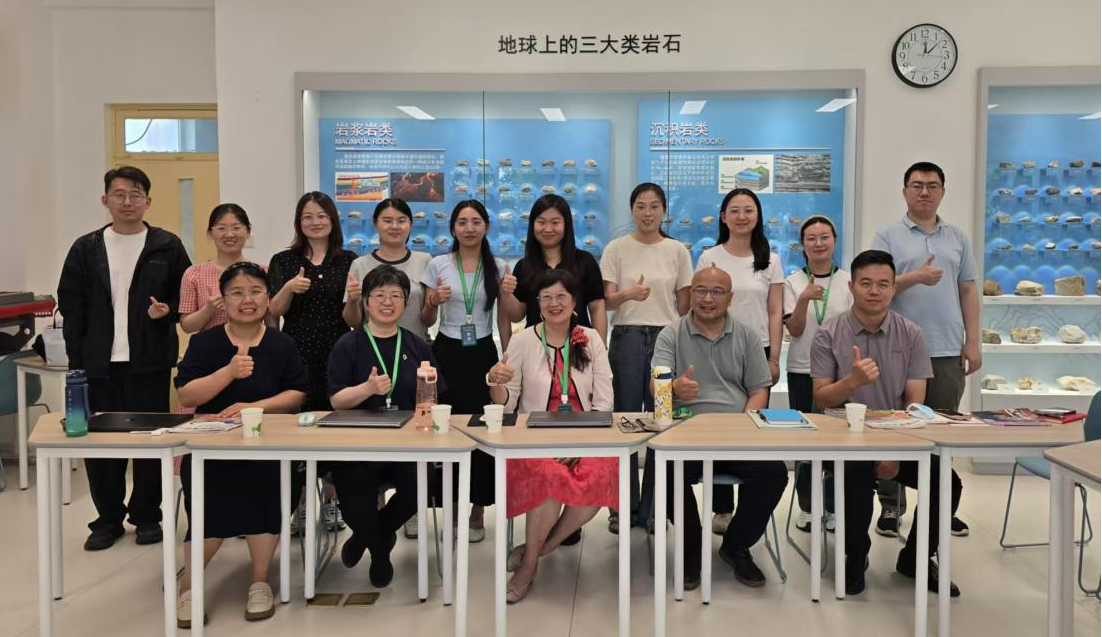为推动社会性科学议题学习(SSI-L)课程的创新与实践,探索科学教育与人文教育融合的育人新模式,2025 年 6 月 25 日,北京师范大学亚太实验学校在地球与环境实验室召开“社会性科学议题学习(SSI-L)”项目研讨会,主题是校本教材的研发。会议特邀国家高端人才引智项目受聘专家、国际科学教育权威学者、台湾师范大学荣誉教授邱美虹出席指导。北京师范大学 SSI-L 项目负责人、中国基础教育质量监测协同创新中心科学提升部主任林静及其项目办团队成员、北京师范大学亚太实验学校SSI-L项目团队教师共同参与会议。会议由北京师范大学亚太实验学校 SSI-L 项目负责人胡海军主持。

会议伊始,与会人员围绕校本教材研发展开了深入研讨,明确了校本教材编写的核心原则与方向。主编林静阐释了校本教材编排的主线与框架,规划了教材章节目录的编写与活动建议。校本教材编写组教师围绕教材框架进行深入的探讨,明晰了教材的逻辑主线,同时针对活动年级段划分、教学活动设计等方面存在的困惑展开讨论。邱美虹教授建议,利用可视化图表帮助小学生解读抽象科学概念,可融入科学建模教学,引导学生通过观察、模拟、验证,在科学实践中构建可迁移的科学认知。
会议进一步研讨了教材的栏目设置,强调教材编写需兼顾开源性、拓展性、挑战性与连贯性。北京师范大学亚太实验学校将以此次会议为契机,进一步总结归纳实施SSI-L两年来的心得,通过校本教材研发来进一步落实SSI的育人价值,通过SSI跨学科综合化课程实施来着力培养兼具科学素养与社会担当的时代新人,为探索科学教育与人文教育融合的育人新模式提供鲜活实践范例。
撰稿:亚太实验学校
To promote the innovation and practice of Socioscientific Issues-based Learning (SSI-L) curriculum and explore a new educational model integrating science education and humanities education, on June 25, 2025, the Asia-Pacific Experimental School of Beijing Normal University held a Socioscientific Issues-based Learning (SSI-L) project seminar in the Earth and Environment Laboratory, with the theme of school-based curricula development. The meeting specially invited Professor Chiu Mei-Hung, an expert under the National High-end Talents Project, an authoritative international scholar in science education, and an honorary professor at Taiwan Normal University, to provide guidance. Lin Jing, the project leader of the Beijing Normal University SSI-L Project and Director of the Science Development Department of the Collaborative Innovation Center of Assessment for Basic Education Quality, along with members of the project office team and teachers from the Asia-Pacific Experimental School of Beijing Normal University SSI-L project team, participated in the meeting. Hu Haijun, the SSI-L project leader at the Asia-Pacific Experimental School of Beijing Normal University, hosted the meeting.
At the start of the meeting, participants engaged in in-depth discussions on the development of school-based curriculum, clarifying the core principles and directions for material compilation. Chief Editor Lin Jing elucidated the main thread and framework for textbook organization, planning the compendium of the school-based curriculum’s chapter outline and activity suggestions. Participating teachers conducted in-depth discussions around the textbook framework, clarifying the logical main thread of the materials while addressing confusions regarding grade-level divisions for activities and the design of teaching activities. Professor Chiu Mei-Hung suggested using visual charts to help primary school students interpret abstract scientific concepts, incorporating scientific modeling teaching to guide students in constructing transferable scientific understanding through observation, simulation, and verification in scientific practice.
The meeting further discussed the column structure of the textbook, emphasizing that material development must balance openness, expansiveness, challenge, and coherence. The Asia-Pacific Experimental School of Beijing Normal University will take this meeting as an opportunity to further summarize insights gained from two years of SSI-L implementation, and advance the educational value of SSI through school-based curriculum development. By implementing an interdisciplinary, integrated SSI curriculum, the school aims to cultivate individuals of the new era with both scientific literacy and social responsibility, providing a vivid practical example for exploring a new educational model that integrates science education and humanities education.
